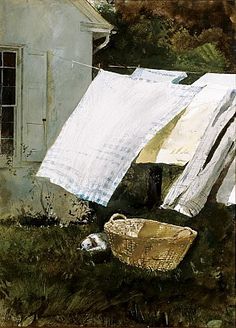
Such an idyllic scene. Clean sheets blowing in the breeze. The sun warming the fabric (100% organic cotton, I’m thinking), filling it with the scent of the outdoors.
These days, with Americans disagreeing on issues from bathrooms to vaccines, you’d think clotheslines (their existence, their value, their esthetic) would be pretty far down the list of causes to examine. Turns out, our planet’s economic and environmental future hangs on an unlikely thread: the clothesline.
Did you know that your clothes dryer uses more electricity than your refrigerator?
I didn’t either.
Northwest Power and Conservation Council estimate households in the Northwestern states use 4.3 % of their annual electricity consumption to dry laundry. Compared to the 3.5% from refrigerators. (They didn’t mention if those were self-defrosting refrigerators.)
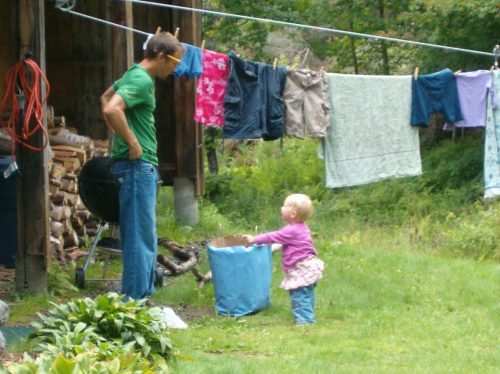
Here’s how the issue settles out.
On the pro-clothesline side, we have Project Laundry List out of Concord, NH. Their goal is “to make air-drying and cold-water washing laundry acceptable and desirable as simple and effective ways to save energy.” There are other groups, I’m sure, but Project Laundry List has a website and a Facebook Page (Drying for Freedom).
According to the website grist.org, The New York Times has reported that the typical US household could prevent 1,500 pounds of carbon dioxide from entering the atmosphere each year by simply turning off its dryer and hanging the clothes outside in the sun. AND, as an aside, dryers cause more than 12,000 residential fires annually.
[editorial note here: I could not find this NYTimes article).
On the down-with-clotheslines up-with-electricity side, we have various homeowner associations, condominium boards, and trailer park owners, all worried about property values, who have established bans on outdoor clotheslines across the country.
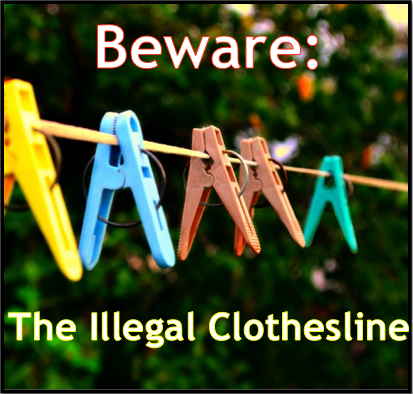
We also have the electricity industry — this is where the politics comes in — which has, from 1945, promised “we could live better electrically.” The YouTube link to the 1950s era commercial is 3+ minutes. But it features some familiar faces. Really, take a peak.
And for you diehard fans, here’s another with the same “cast,” this one featuring electric lighting.
We did live “better” too. We had toasters and dishwashers and vacuums and irons and heaters and coolers and ovens and ranges and power washers and toys.
But it was based on a dream. An electric dream that was never to end, and in the process, increasing the demand for coal across the globe where developing nations began their own love affair with an electric utopia.
And has there ever been a Utopia that ended well?
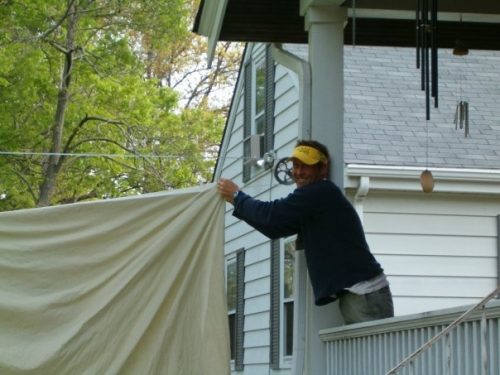
Fast forward to the 21st century, and we have the British documentary, Drying For Freedom, describing it all.
“It seems like such a mundane thing, hanging laundry, and yet it draws in all these questions about individual rights, private property, class, aesthetics, the environment,” said British filmmaker Steven Lake, who crisscrossed the world to unravel the reasons and consequences for the banishing of the clotheslines in favor of tumble dryers.
Here’s how it bills itself: From the laundry-less gardens of sunny California to India’s communal open air Laundromats, DRYING FOR FREEDOM is a voyage into the new environmental battlefield where money, status and class come first and our planet is a poor second.
You might want to check out their newer trailer here.

Do you live in a “right to dry” state?
Let’s start with the six states that have declared any community ban on clotheslines to be void and unenforceable.
Colorado, Hawaii, Maine, Vermont, Florida, Utah
(Yeah, Vermont!)
If you live in one of these six states and your homeowner’s association, condominium board, or trailer park owner tries to ban your clothesline, You Don’t Have To Do It!
While the legal distinction is beyond my pay grade, these 14 states have “solar access laws” on the books to protect “solar drying.”
Arizona, California, Illinois, Indiana, Louisiana,
Maryland, Massachusetts, Nevada, New Mexico,
North Carolina, Oregon, Texas, Virginia, and Wisconsin
If you live in any of these additional fourteen states, you are free to use “solar drying” to your heart’s content. Just show the arresting officer this blog.

Alas, those of you living in one of the remaining 30 states. I’d love to hear from you if you hang laundry outside to dry. And, even if you don’t.
Just remember, the next time you do your laundry,
Our future is hanging on the line.
(cute, huh? It’s not original with me.)
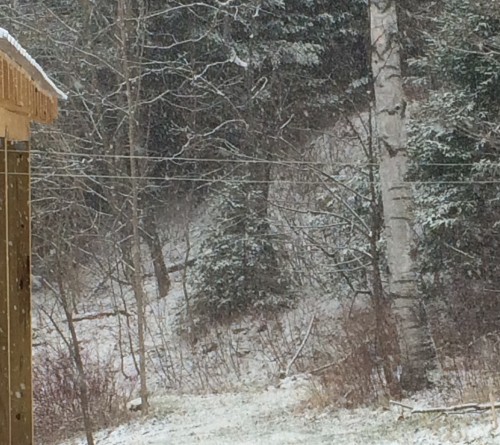
How about you? Where do you stand vis a vis your own clothesline?
The Results Are In: Reader Response to My 2019 Survey – Janet Givens
[…] Is There a Clothesline in Your Backyard? […]
Ronald Shaffer
I think about Janet often. All my memories are good ones. I sincerely hope she has had a happy and fruitful life. I hope her husband, whoever and wherever he is, knows and is thankful for his lucky and blessed life. God bless.
Janet Givens
Ronald, I’m thinking you may have me mixed up with the other Janet L Givens author. I’m afraid I don’t recognize your name
Airing Laundry | Tuesdays with Laurie
[…] of my favorite posts on Janet Givens blog is when she wrote about clotheslines. In reading that post, I learned that people are passionate about whether outdoor clotheslines […]
LOIS RIGHTMYER
I have been hanging my clothes out on the line for 40 years in our New Westminster, BC neighbourhood. One of my neighbours and I used to have a contest to see who got their wash out first.
I can tell that my new neighbours (who also hate our tree) look down on our quaint habit. So far, no bylaws against it.
Janet Givens
Hello Lois and welcome. I’m glad you found this old blog post of mine; it’s one of my favorites. I imagine you miss that former neighbor of yours.
Flora Brown
I grew up in St. Louis, MO with a clothesline in our backyard. We lived in the city, but the clothesline was in the backyard out of sight of anyone passing the front of the house. At first it was a necessity since we didn’t have a dryer, and I don’t recall if public laundry mats existed.
When I first got married nostalgia led me to hang clothes in my backyard in Los Angeles, which like my childhood home, was out of sight of anyone walking or driving by the front of the house. Even though I loved modern conveniences, I at first believed diapers and other items benefitted from the sunshine, and I loved the smell. When my maternity leave ended and I returned to full-time teaching, however, I gave that practice and put my new washer and dryer into full operation.
There are many who still believe in the benefits of hanging your laundry. Just look up National Hang Out Day celebrated on April 19th by Project Laundry List.
Janet Givens
Hi Flora, Thanks so much for visiting. Ah the smell of those clean, sunshine-dried, thick, cloth diapers. I can feel them rubbing my nose as I breath in the memory. Thanks for that.
Janet Givens recently posted…LEAPFROG INTRODUCTION